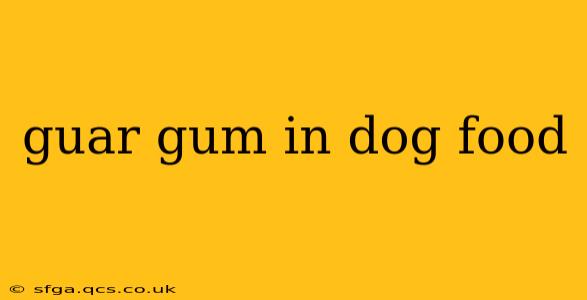Guar gum is a common ingredient found in many commercial dog foods, often sparking curiosity and even concern among pet owners. This comprehensive guide delves into the role of guar gum in dog food, addressing common questions and concerns to help you make informed decisions about your canine companion's diet.
What is Guar Gum?
Guar gum is a natural, plant-based polysaccharide derived from the guar bean ( Cyamopsis tetragonolobus). It's a soluble fiber, meaning it dissolves in water, forming a viscous gel. This gel-like consistency is what gives guar gum its unique properties and makes it a valuable additive in various industries, including the pet food industry.
Why is Guar Gum Used in Dog Food?
Guar gum's inclusion in dog food serves several purposes, primarily centered around improving the food's texture and functionality:
-
Thickening and Binding Agent: Guar gum acts as a thickening agent, helping to create a desirable texture and consistency in both wet and dry dog foods. It binds ingredients together, preventing separation and maintaining the integrity of the kibble or pate.
-
Improved Palatability: The smooth, slightly viscous texture can enhance the palatability of dog food, making it more appealing to finicky eaters. This is particularly helpful for dogs with dental issues or those who struggle to consume dry kibble.
-
Stabilizer: Guar gum helps stabilize the emulsion of ingredients, preventing separation of fats and oils over time. This ensures the dog food maintains its desirable texture and appearance throughout its shelf life.
-
Dietary Fiber Source: While not a primary source of fiber, guar gum contributes to the overall fiber content of the food, which can support healthy digestion. However, it’s crucial to remember that guar gum is not a replacement for other important dietary fibers.
Is Guar Gum Safe for Dogs?
The FDA generally recognizes guar gum as safe for use in animal food. In moderate amounts, it's considered non-toxic to dogs. However, like any ingredient, excessive consumption can lead to potential issues.
Potential Side Effects of Excessive Guar Gum Consumption:
-
Gastrointestinal Upset: Large quantities can cause diarrhea, bloating, and gas due to its high fiber content. This is especially true for dogs who are not accustomed to high-fiber diets.
-
Interactions with Medications: Guar gum can potentially interact with certain medications, so it's crucial to consult with your veterinarian if your dog is on any prescription drugs.
How Much Guar Gum is Too Much?
There's no universally defined "safe" amount of guar gum for dogs, as it varies based on factors like the dog's size, breed, age, and overall health. The amount used in commercially produced dog food is typically carefully controlled and within safe parameters. However, if you're concerned, examine the ingredient list of your dog's food and look for other fiber sources to ensure a balanced approach.
What are the Alternatives to Guar Gum in Dog Food?
Several other ingredients can provide similar thickening and binding properties in dog food, including:
-
Other Gums: Xanthan gum, locust bean gum, and carrageenan are examples of alternative gums that might be used.
-
Starches: Potato starch, tapioca starch, and corn starch can provide thickening properties.
Does Guar Gum Cause Allergies in Dogs?
Guar gum allergies in dogs are rare. However, any ingredient has the potential to cause an allergic reaction in susceptible animals. Symptoms of an allergic reaction could include itching, hives, vomiting, or diarrhea. If you suspect your dog has a guar gum allergy, consult your veterinarian immediately.
Is Guar Gum a Good Source of Fiber for Dogs?
While guar gum does contribute to the fiber content of dog food, it is not a complete fiber solution. A balanced diet should provide a variety of fiber sources from various vegetables, fruits (in moderation), and other ingredients. Relying solely on guar gum for fiber is not recommended.
By understanding the role and potential effects of guar gum in dog food, you can make informed choices to ensure your dog receives a nutritious and balanced diet. Always consult with your veterinarian if you have any concerns about your dog's diet or specific ingredients.
